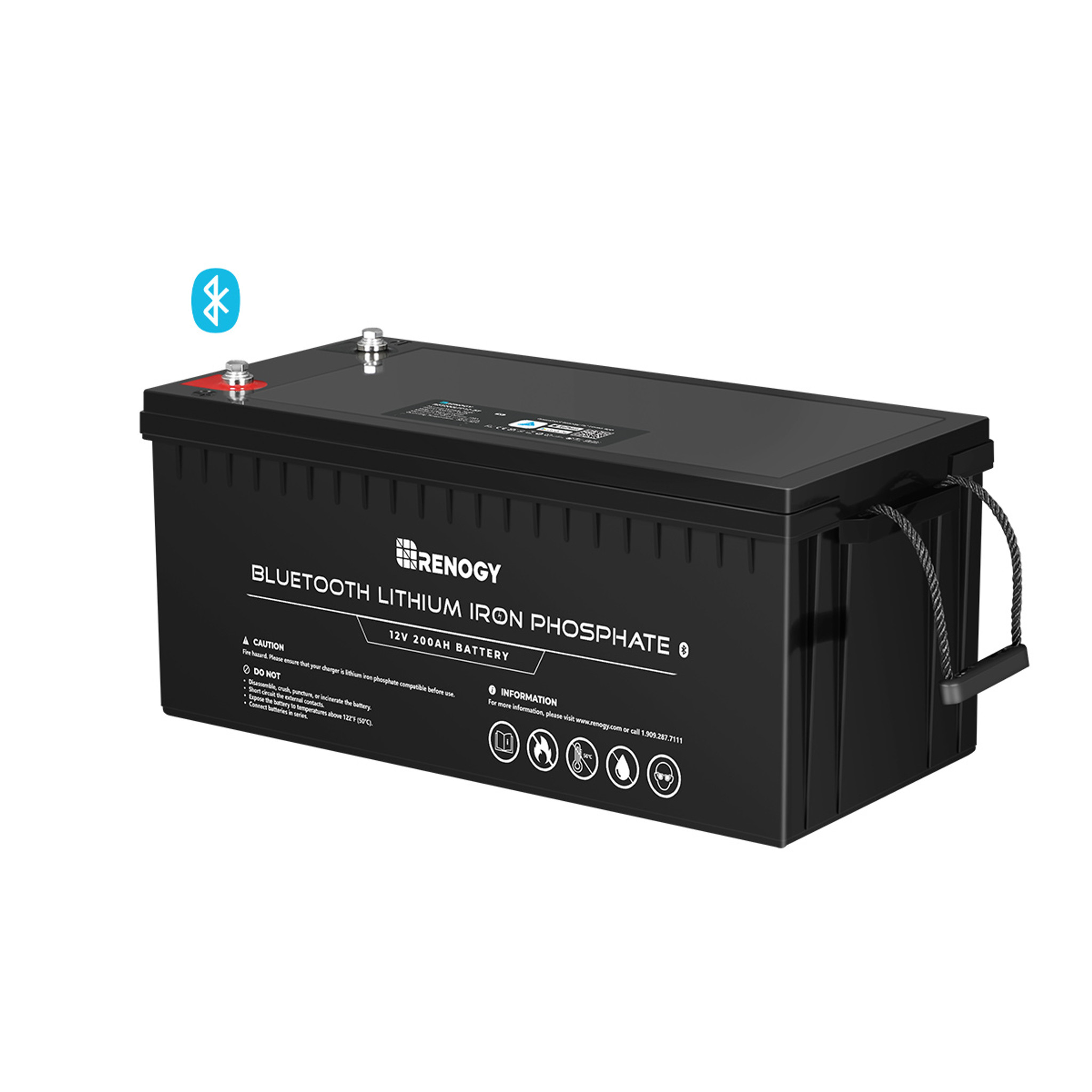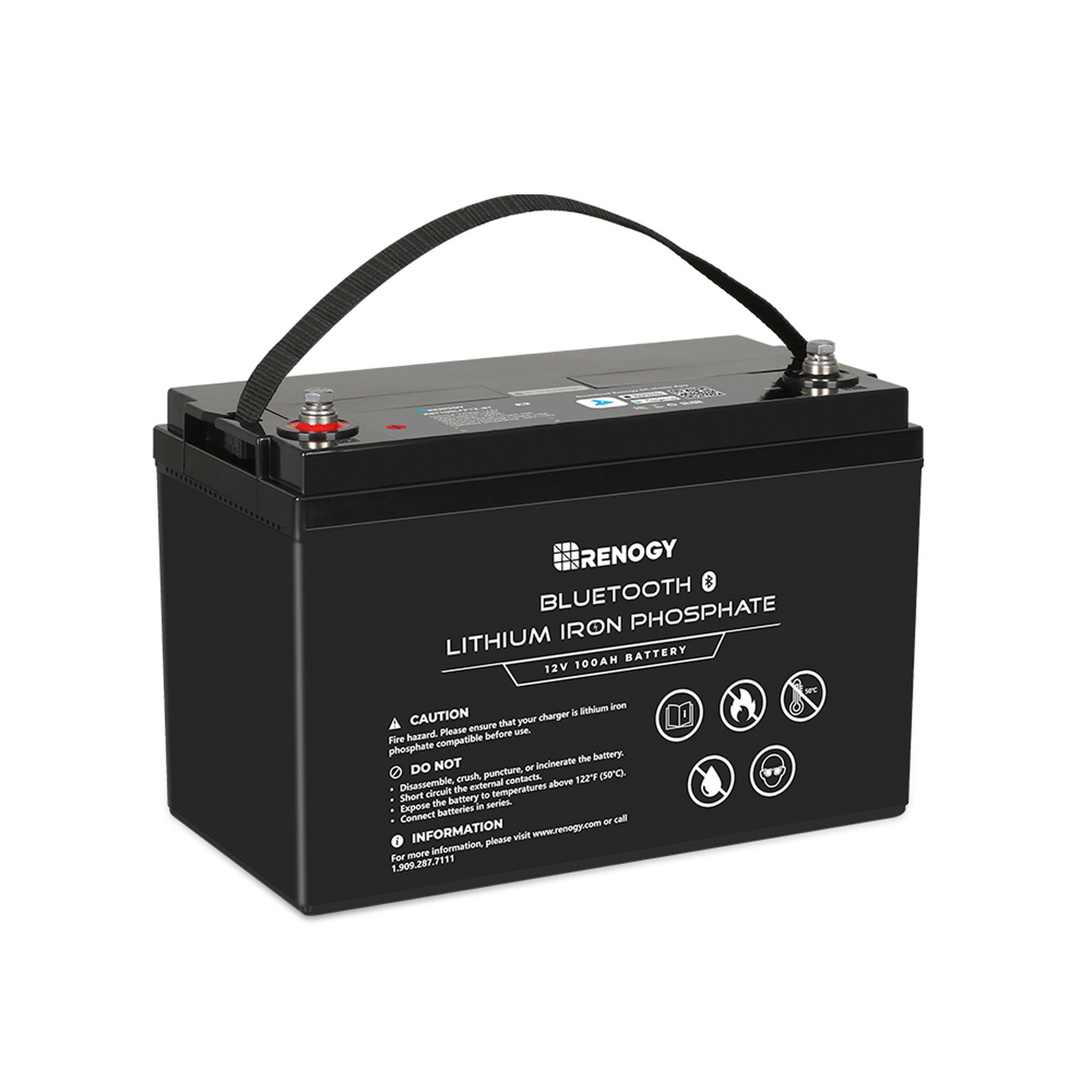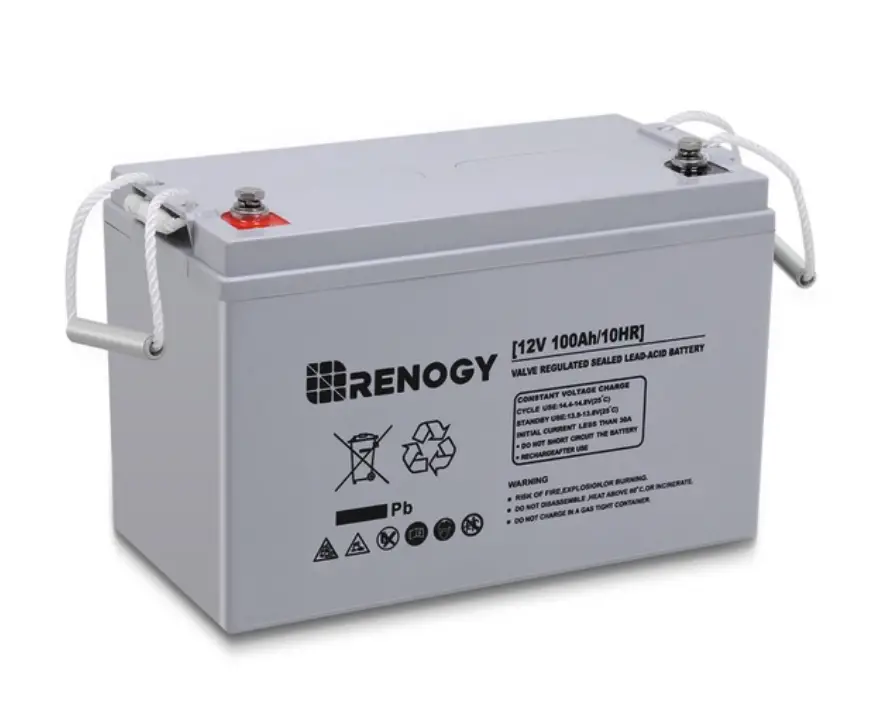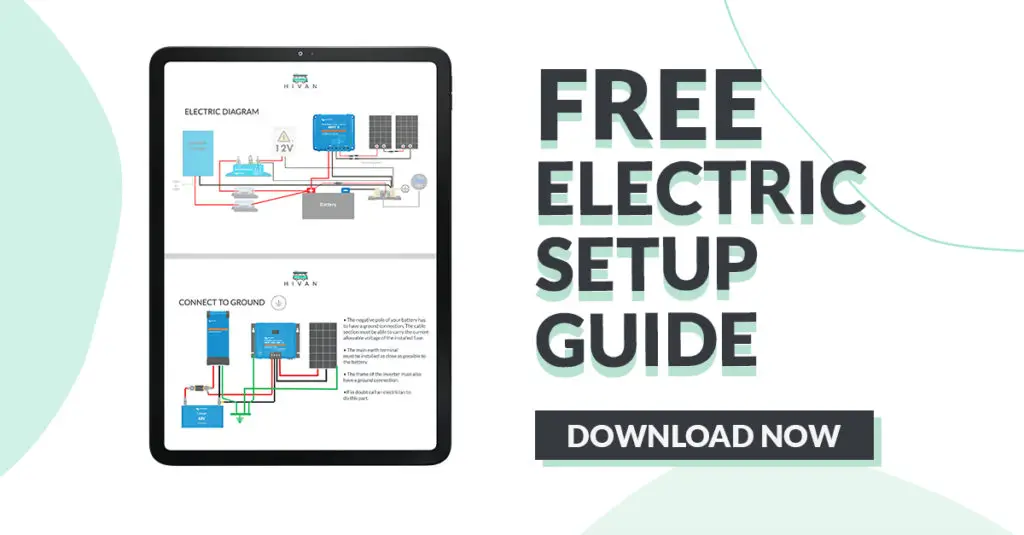Hi-van is supported by its audience. When you purchase using our links, we may earn an affiliate commission (no added cost to you). Learn more
A lot of people are opting for environment-friendly and cost-efficient energy solutions for their homes. One of these is going for a solar energy system, which is also the ideal energy source for those who live in motorhomes and RVs. This is because solar power can be portable, provided that you have batteries to store all the solar energy you have collected and to enable charging wherever you are.
To get the best batteries for your on-the-go solar system, you need to consider a few things like battery capacity, ease of installation, charging time, lifespan, warranty, and affordability. Take all of these together, and you’ll have an easier time finding the best batteries to suit your needs.
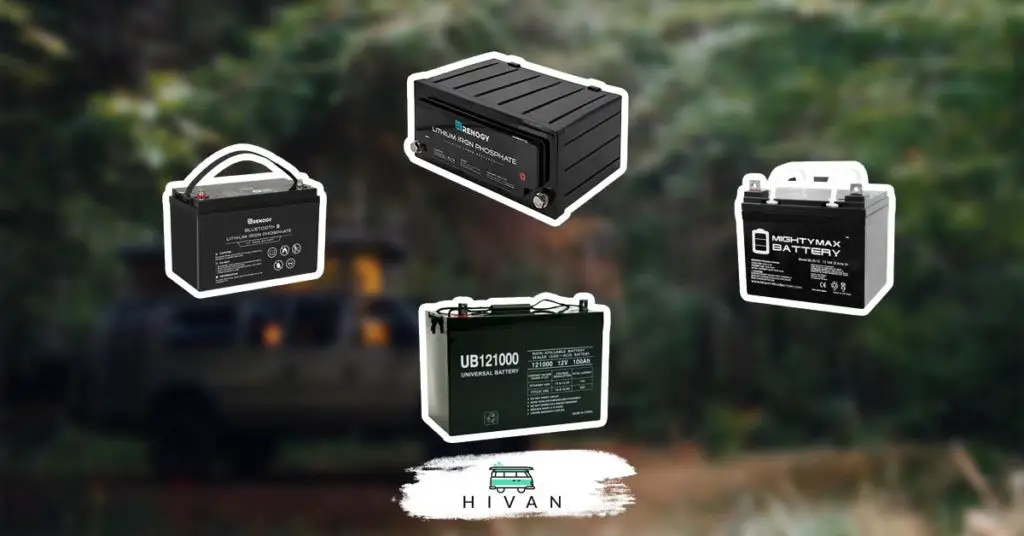
In this article, we will talk about all the things you need to know about portable solar batteries, including the different types to choose from, the various considerations, what makes them important, and the features to look out for. We will also give a list of recommendations for the best batteries for your on-the-go solar energy system.
How Does a Solar Energy System Work?
A solar energy system works by converting the sun’s light into electricity. The electricity created from solar energy can then be utilized in your home or exported to the power grid.
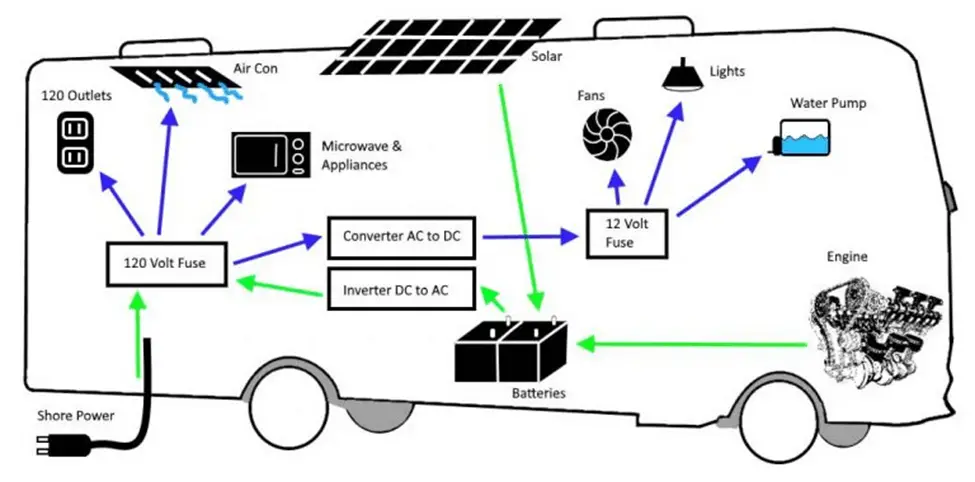
You can collect solar energy and convert it into electricity by installing solar panels on your roof. These solar panels are made up of PV or silicon photovoltaic cells, which absorb the sun rays and generate direct current electricity from them.
But because DC electricity is not suitable for your home appliances to use, it is fed into a central solar inverter where it gets converted to alternating current electricity. The AC electricity is then directed to your switchboard.
The switchboard allows the AC electricity to be transported to your home appliances. This switchboard also ensures that your home consumes solar energy first and that you only access energy from the power grid when your solar energy production is insufficient. In other words, the switchboard makes sure that you don’t use non-solar electricity when you don’t have to, and it keeps your utility bills at a minimum.
How Do Solar Batteries Work?
Solar batteries, also known as deep cycle batteries or solar storage batteries, are an essential component of any solar power system. They store the energy generated by solar panels during the day so that it can be used at night or during periods of low sunlight. Here’s how solar batteries work:
- Charging: Solar batteries are charged by solar panels during the day. As sunlight hits the panels, they convert the energy into DC electricity, which is then sent to the battery for storage through a charge controller.
- Storing: The battery stores the energy in chemical form, using a process called electrochemical reaction. The battery is designed to hold a large amount of energy, which can be used when needed. Depending on your type of battery, you’ll be able to store more or less energy.
- Discharging: When the solar panels are not generating enough energy to power your home or RV, the battery discharges its stored energy. The battery converts the chemical energy back into electrical energy, which can be used to power your lights, appliances, and other devices.
This cycle goes on and on until you need to change your battery because your reached its maximum cycles allowance.
Are solar batteries different from other types of batteries?
Yes, solar batteries are different from other types of batteries in several ways. Here are some of the main differences:
- Deep Cycle: Solar batteries are designed to be deep cycle batteries, meaning they can discharge a large portion of their capacity without being damaged. This is different from other types of batteries, such as car batteries (the ones in the engine bay), which are designed for short bursts of high power.
- Capacity: Solar batteries generally have a higher capacity than other types of batteries, allowing them to store more energy. This is particularly important for RV solar systems where space is limited, you don’t want to have your solar batteries taking half of your storage capacity.
- Durability: Solar batteries are built to withstand harder environmental conditions, such as extreme temperatures, humidity, and vibration. This makes them perfect for your RV.
- Maintenance: As every other types of batteries, solar batteries require regular maintenance to ensure optimal performance and longevity. This includes monitoring the battery’s charge level, checking for signs of wear and tear, and replacing the battery if necessary.
- Cost: Solar batteries are typically more expensive than other types of batteries, due to their higher capacity and durability.
Solar Batteries: Each Chemical Types Explained
When looking for the best batteries for your on-the-go solar system, it would help if you know about the different solar batteries beforehand so that you don’t get lost in technical terms. This would also help make sure that you get the exact battery you need.
Batteries used for energy storage are usually made of lithium-ion or lead-acid. There are also saltwater batteries, which are new players in the game.
Lithium Batteries
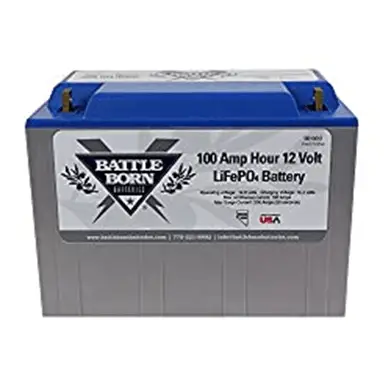
Lithium batteries are a relatively new technology, hitting the market only in the 70s. These batteries are commonly used in cellphones and laptops. They have also become popular in the renewable energy space.
Compared to lead-acid batteries, lithium batteries are more expensive, but they have a longer lifespan, there is no need for maintenance, they deliver a more efficient power usage, they have a more usable storage capacity, and there is no off-gassing or ventilation.
Lead-Acid Batteries
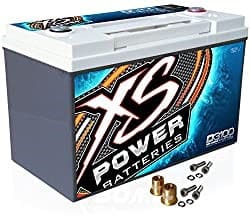
Lead-acid batteries are the oldest and most common type of solar battery. They are reliable, affordable, and have a long history in the solar industry. However, they are heavy, require regular maintenance, and have a shorter lifespan than other types of batteries.
FLA batteries (Flooded Lead-Acid) are one of the most commonly used types of batteries for solar power systems that are not connected to an electric service provider. And they’ve been used for the last 150 years. This battery type is very affordable and is 99-percent recyclable. What’s more, it is easy to dispose of when it has reached the end of its lifespan.
This battery type is the best to get for your solar system if you are looking for an affordable option. However, it needs some hands-on monitoring as well as regular maintenance. The plates of every cell in an FLA battery have to be submerged in water so they can function properly. You will need to add water every one to three months to keep these plates submerged. So it’s just right to check on them once every month.
Moreover, FLA batteries are designed to handle everyday charge cycling. But, as a result, they emit gas as a byproduct. As such, they need to be ventilated properly.
Nickel-Cadmium Batteries
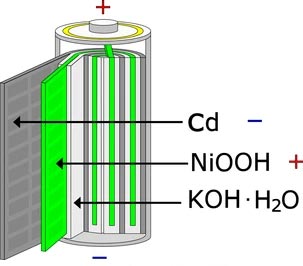
Nickel-cadmium batteries are a type of rechargeable battery that has been used in solar power systems for many years. They use nickel oxide hydroxide and metallic cadmium as electrodes (source: Wikipedia).
Here’s a list of their main advantages:
- They are more difficult to damage than other batteries and can tolerate deep discharge for long periods.
- Ni-Cd batteries typically last longer in terms of the number of charge/discharge cycles than other rechargeable batteries like lead/acid batteries.
- They have a higher energy density than lead-acid batteries and are smaller and lighter, making them preferred in RV solar systems.
- NiMH batteries have a higher capacity and are less toxic than Ni-Cd batteries, but Ni-Cd batteries have a lower self-discharge rate and slightly lower internal resistance, allowing them to achieve a higher maximum discharge rate.
Important Specs to Consider when Buying Solar Batteries
When weighing your options for solar batteries, there are certain specifications that you need to consider. Knowing these criteria would allow you to sift through the specs for each product, compare these energy storage options with each other, weigh down each of their pros and cons, and match each option with your unique requirements.
These criteria include the battery’s:
- Capacity and power ratings
- Ease of installation
- Depth of discharge
- Charging time
- Lifespan or battery life
- Round-trip efficiency
- Manufacturer’s warranty
- Affordability
More info: Check the following guides about Solar Systems:
– How many solar panels do I need for my van?
– How to extend the life of your van solar battery system
– How do solar panels work on a van? (an in depth look)
Capacity and Power Ratings
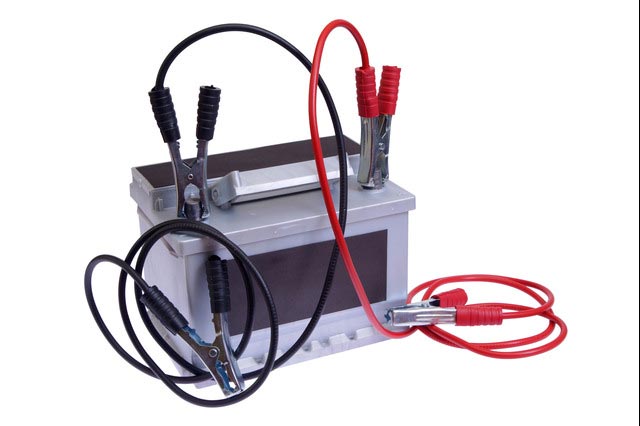
In summary, the capacity of a battery is how much energy it can hold, and the power rating is how fast it can provide that energy.
A solar battery’s capacity refers to the amount of electricity it can store all in all. This is measured in kilowatt-hours (kWh). Home solar batteries are mostly designed in such a way that you could stack them together, meaning you have the option to install many more batteries with your solar energy system so you can store a lot more energy and get extra capacity.
Capacity indicates how big the battery is, but it does not tell you the amount of electricity it can deliver to you at any given moment. You also have to consider the power rating of your battery. When it comes to solar batteries, the power rating is defined as the amount of electricity your battery can provide at one time. Power rating is measured in kilowatts (kW).
A battery that boasts a high capacity yet has a low power rating would also provide a low amount of electrical power, although still enough to use a few much-needed appliances for a while. A battery that is low-capacity, but whose power rating is high can power your entire home, yet for only for a limited number of hours.
Depth of Discharge

Depth of discharge is an important feature to consider when searching for a battery because it determines how much energy you can use from the battery before it needs to be recharged.
Batteries with a higher depth of discharge can provide more usable energy and may be more efficient for certain applications, such as solar power systems in your RV.
To illustrate, if a 10 kWh solar battery has a 90-percent DoD, you should not consume over 9 kWh of this battery before you recharge it. So, essentially, a higher DoD entails that you can consume more of your battery’s capacity.
Round-Trip Efficiency
Round-trip efficiency is a measure of how efficiently a battery can store and release energy. It tells you how much energy is lost during the process of charging and discharging a battery.
To illustrate—Let’s say you have a battery with a round-trip efficiency of 80%. If you charge the battery with 100 units of energy, you will only be able to discharge 80 units of energy from the battery. The remaining 20 units of energy are lost during the charging and discharging process.
When you have a higher round-trip efficiency, you get more economic value out of your solar battery.
Battery Life
Battery life refers to the number of charge and discharge cycles a battery can undergo before it needs to be replaced.
We can use our cellular phone’s battery as an example: You charge your mobile phone every night so you can use it during the day. But the older your phone gets, you will observe that the battery is no longer holding the same amount of energy it used to when it was just new.
It is mainly determined by the battery’s chemistry and construction. For example, a lithium-ion battery may have a lifespan of 1000-2000 charge and discharge cycles, while a lead-acid battery may have a lifespan of 500-750 cycles.
But just as solar panels’ lifespan has significantly increased in the past decade, people can expect that solar batteries will follow suit, considering that the market for energy storage solutions continues to grow.
Regular and proper maintenance work can also affect your solar battery’s lifespan significantly. Make sure to pay attention to the rating indicated on the packaging because the longer you want your battery to last, the pricier it will be.
Warranty
Batteries have a warranty, which guarantees a specified number of years for its useful life or number of cycles. And because your battery’s performance declines over time, many battery manufacturers will also guarantee that their products keep a certain capacity all throughout the warranty.
Thus, how long your solar battery will last depends on the manufacturer and brand, and the capacity can be expected to dwindle over time.
Manufacturer
Many different manufacturers are developing, producing, marketing, and selling solar battery products. These manufacturers even belong to different industries, from tech startups to automotive companies.
Choosing a reputable manufacturer when buying a battery for a solar system is very important. You will have the garranty of high-quality materials and manufacturing processes to ensure the battery is safe, reliable, and long-lasting.
They will also typically offer warranties and customer support to ensure you are satisfied with your purchase.
Here are some reputable manufacturers of batteries for RV solar systems:
The Best Solar Batteries – Our Selection
Renogy 200Ah Lithium Battery for its Capacity
State-of-the-art battery cells ensure a lifespan of more than 2000 cycles, 200A continuous discharge current, and a wide operating temperature range.
- 📱 The battery can be monitored remotely in real-time with mobile devices thanks to its built-in Bluetooth module.
- 🚀 The battery is an efficient drop-in replacement for deep-cycle lead-acid batteries and can safely discharge to 100% DOD, delivering twice the energy of a lead-acid counterpart while only weighing half as much.
- 🔋 The battery features state-of-the-art battery cells, an advanced BMS (Battery Management System), and an auto-balancing function to optimize the battery’s performance and lifespan.
- 💦 The battery is fully protected against dust, particulates, and low-pressure jets of directed water, making it suitable for most outdoor scenarios such as yacht.
Battle Born 100Ah LiFePO4 Battery for its Sustainability
- Built-in BMS
- Lightweight and versatile
- Proudly designed and assembled in Reno, Nevada
- 10 year warranty
- 🛡️ The battery is equipped with a “Battery Management System” (BMS) which helps protect the battery and regulates the amount of power taken out of the battery.
- 🔋 The battery is made of lithium-ion technology which has exceptional longevity, and is more cost-effective than Lead Acid batteries.
- 🌱 The product is made from 100% safe, nontoxic, and renewable energy, making it a sustainable green energy battery.
- 🏋️ The battery is lightweight and versatile, weighing only 31 lbs, and can be safely mounted in any position, making it perfect for marine, RV, campers, golf cart, off-road, and off-grid applications.
- 🔌 Easy to install the battery with its sturdy side post connectors for the wires.
Renogy 100Ah Lithium Battery for its Price/Performance
- Uncompromising Quality
- Easy Upgrades
- Reliable BMS System
- Auto-balancing Function
- Real-time monitor
- 📱 It has Bluetooth 5.0 connectivity, which allows users to monitor its status in real-time.
- 🌧️ The battery is waterproof, with an IP65 rating, making it suitable for outdoor use.
- 🔋 The battery has a lifespan of more than 2000 cycles and a continuous discharge current of 100A.
- 📦 Buyers can bundle the battery with the 12V DC-DC Battery Charger with MPPT to get an extra 10% discount.
- 📏 The battery’s dimensions are 12.99 x 6.85 x 8.27 inches.
- 💡 The advanced Battery Management System intelligently monitors the battery’s operating conditions and oversees its safe operations.
Renogy 100Ah AGM Battery for its Cost
Built tough with a leak-proof design, this maintenance-free battery was designed with solar energy storage applications in mind and provides optimum performance even at freezing temperatures.
- 💰 Renogy’s 12V Deep Cycle AGM Battery stays one of the most affordable solution available nowadays.
- 🚚 It comes with free shipping and a reliable warranty.
- 🌡️ The battery is designed to perform well in extreme temperatures, from 5℉ (-15℃) to 122℉ (50℃), and can power most appliances with a high startup current.
- 🔋 Renogy’s AGM batteries have a low monthly self-discharge rate when not in use and can be connected in series or parallel to expand power capacity.
- 🌞 The battery is ideal for solar energy storage applications and can handle cyclic uses, such as RVs, boats, medical equipment, and lawnmowers.
Final Thoughts
However, without a battery, portable solar systems are practically useless. The battery serves as a storage unit for whatever energy you collect from the sun while you’re on the road or camping in an off-grid location. As such, you also need to get one of the best and highly recommended batteries for on-the-go solar to make sure you can get what you require from your energy system.
Find this content useful 🙂 ?
Subscribe to our Newsletter and get a free Solar Electric Diagram + shopping list.

